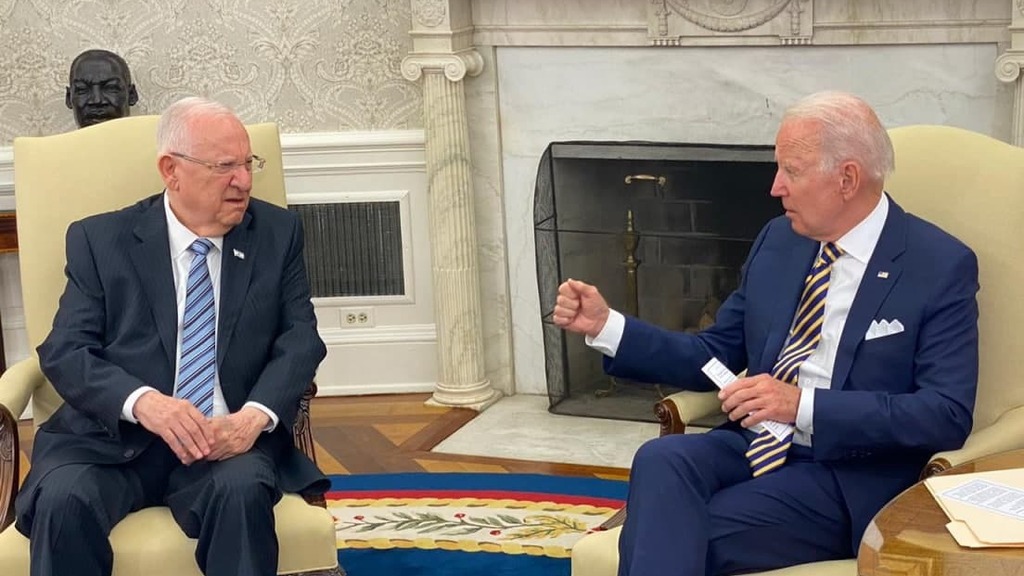"When push comes to shove, I don't think Palestinians are going to be the impediment to my idea. The problem is us,” says Federation Movement co-chair Emanuel Shahaf of his fellow Israelis.
According to its website, the Federation Movement advocates a new approach to resolving the Israeli-Palestinian conflict, with Israel and the West Bank broken up into 30 cantons operating independently "under the auspices of a federal constitution which guarantees the rights of all."
4 View gallery


An Israeli flag flutters near houses in the West Bank settlement of Otniel
(Photo: Reuters)
As such, it calls for Israeli law to be applied to the West Bank and for the Arab residents of the territory to be granted Israeli citizenship. Under its plan, Israel's West Bank settlements would also remain, with the IDF acting as the sole military force in Israel and the West Bank.
While the Palestinian Authority – which gains its legitimacy from efforts to achieve a two-state solution – would never agree to the federation concept, Shahaf believes that the Palestinian public will be less resistant. Most will accept the loss of a sovereign state in return for equal rights under Israeli rule, he argues.
After all, the current arrangement on the ground is essentially a federation already – just one that is neither equitable nor logical, the former Mossad official says.
Many Palestinians might not agree with Shahaf’s assessment, particularly those concerned about ‘normalization,’ a taboo term referring to any cooperation between Palestinians and the State of Israel.
Just as problematic will be the status of the Gaza Strip, which the Federation Movement suggests be kept separate from the hypothetical federation. The enclave “must be dealt with, but this probably will happen as a separate state with an airport, a port, and border arrangements.”
To date, no Israeli political party has come out in support of the Federation Movement’s plan, possibly because both right-wing hawks and left-wing doves see Shahaf’s concepts as coming from the opposing end of the political spectrum.
Even a casual perusal of its website could leave a reader confused as to where the movement stands, a deliberate act by an organization seeking to find compromise in the middle.
Rightists don’t approve of its messaging because “they see a basic problem when Jews don't receive the superiority that they [feel they] deserve,” Shahaf says.
Some are concerned that the country would be flooded with returning Palestinians; an issue that could be mitigated by negotiations with neighboring Arab states to arrange citizenship for refugees in their host countries, he says.
Leftists on the other hand disapprove of the Federation’s ideas, suspecting it of attempting to sneak rightwing ideology past them. Particularly this is seen in the notion to keep settlements in place, something that leftwing Israelis have an emotional resistance to, out of a desire to avoid seeing settlers “rewarded” for appropriating land.
Another component that leaves the left uncomfortable is that the Federation’s plan can be enacted unilaterally – if necessary – without painstakingly slow negotiations.
4 View gallery


Palestinians in Gaza protest against Israel's now defunct annexation plan, July 2020
(Photo: DPA)
As was the plan with Israel's aborted annexation of the Jordan Valley in 2020, if it so desired, the country could extend citizenship to all Palestinians in East Jerusalem and the West Bank without consulting additional parties, Shahaf says.
Unlike with former prime minister Benjamin Netanyahu’s annexation proposal, the European Union would be unlikely to oppose a unilateral status change by Israel if it were to result in “greater equity,” he says.
The U.S. too would be unlikely to oppose such a move as it is increasingly removing itself from involvement in the conflict, Shahaf argues.
American governments have always suffered when finding themselves embroiled in Israeli-Palestinian politics, leading the administration of U.S. President Joe Biden to put the Middle East on a low gear.
“The Americans are giving us all the rope we need to hang ourselves,” Shahaf says, arguing that the conflict is not Washington’s responsibility to fix.
It is the shared mess of Israelis and Palestinians, and their responsibility to resolve. Perhaps together they can achieve what they have separately failed in. If they were to do so, they would join 27 other countries in the world governed as a federation.
Among the nations following this model are a number of widely successful examples, not least of which is the United States, a union that has dominated global politics for the last century.
The balancing act of centralizing power sufficiently for the country to function, while observing the political identity of states’ (i.e. cantons) worked well for the U.S. and could do so between the Mediterranean and the Jordan River also.
4 View gallery


U.S. President Joe Biden hosting President Reuven Rivlin at the White House, June 2021
(Photo: Itamar Eichner)
Other notable examples include India, Germany, Russia, Belgium, and Canada, but also bear a warning in the guise of the uneasy peace in Bosnia Herzegovina. There, the federated state, one part Bosnia, one part Srpska has been characterized by instability and intransigence since Yugoslavia's bloody break-up in 1995.
A federation could provide Israelis and Palestinians the security and peace they’ve been lacking to this day, where other solutions have failed. If that approach is taken, it would need to be enacted wisely, and with thought to potential problems on the horizon.
For Shahaf and the other members of Israel’s Federation Movement, those considerations have already been weighed. The risks are less daunting than continuing to live with the status quo.
“It’s a good concept, 40 percent of the world is living in a federation,” Shahaf says, perhaps optimistically.


